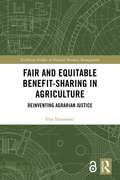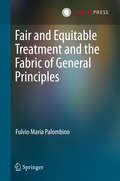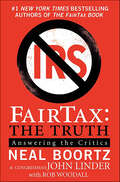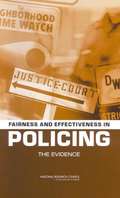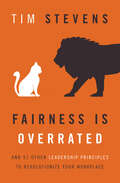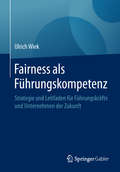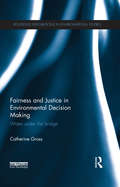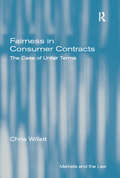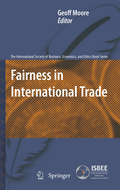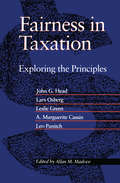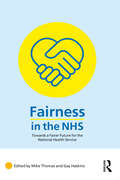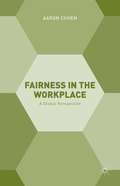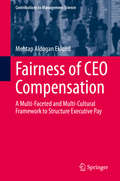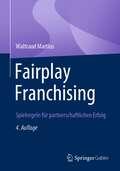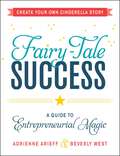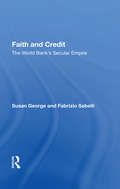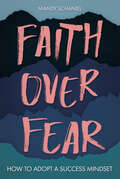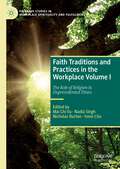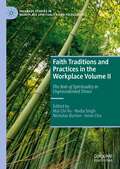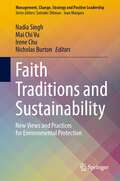- Table View
- List View
Fair and Equitable Benefit-Sharing in Agriculture: Reinventing Agrarian Justice (Earthscan Studies in Natural Resource Management)
by Elsa TsioumaniThis book explores the emergence and development of the legal concept of fair and equitable benefit-sharing, and its application in agriculture. Developed in the 1990s, the concept of fair and equitable benefit-sharing has been deployed in an ever-wider variety of international instruments, including those on biodiversity, climate change, and human rights. A lack of clarity persists however on what fair and equitable benefit-sharing requires and entails, and whether its implementation supports or eventually undermines equity and justice. This book examines these questions in the area of land, food and agriculture, addressing, for the first time, several instances of the agricultural production chain, including research and development, land governance and land use, and access to markets. It identifies challenges regarding implementation of the concept as enshrined in environmental treaties and soft-law instruments, with a focus on the International Treaty on Plant Genetic Resources for Food and Agriculture, the Voluntary Guidelines on Tenure and the UN Declaration on the Rights of Peasants. It investigates its role, enabling conditions and limitations, in a contradictory policy context involving environmental, food security and human rights objectives but also a growing web of multilateral and bilateral trade and investment agreements. Linking international law research with a socio-legal analysis, the book addresses four grassroots examples, which offer ideas for institutional and legal innovation from the local to the global level. This interdisciplinary title will be of great interest to students and scholars of international environmental law, agriculture, land law, development studies and international governance, as well as policymakers and practitioners working in these fields.
Fair and Equitable Treatment and the Fabric of General Principles
by Fulvio Maria PalombinoThis book moves from the circumstance whereby currently the obligation to provide fair and equitable treatment (FET) to foreign investments is included in the majority of international investment agreements and has proved to be the most invoked standard (with the highest success rate) in investor-State arbitration. Hence, it is no exaggeration to regard this standard as the Grundnorm (or basic norm) of international investment law. Yet both its meaning and normative basis continue to be shrouded in ambiguity and, as a consequence, to inspire a considerable number of interpretations by legal writers. The book's precise aim is to unravel such ambiguity, arguing from the idea that FET has become part of the fabric of general international law, but has done so by means of a source somewhat neglected in legal doctrine. This being the category of general principles peculiar to a certain field of international law, i. e. those principles having their own foundations in the international legal order itself, but which, through the mediation of the judge, end up being shaped according to the features typical of a specific normative field. The book, as well as having a solid theoretical backdrop as its basis, offers a careful and critical analysis of pertinent case law, and will prove useful to both scholars and practitioners. Prof. Fulvio Maria Palombino is Professor of International Law at the Law Department of the University of Naples Federico II, and a member of the Executive Board of the European Society of International Law.
FairTax: Answering the Critics
by Neal Boortz John Linder Rob WoodallThe author of the #1 New York Times bestseller The FairTax Book offers a new look at the fast-growing populist tax reform movement that’s poised to become a key campaign issue for 2008In 2005, firebrand radio talk show host Neal Boortz and Georgia congressman John Linder teamed up to create The FairTax Book, the first book devoted to the FairTax movement they had been promoting for years. Riding the growing groundswell of popular support for the tax reform measure, The FairTax Book became an overnight sensation. As the election season heats up, Boortz and Linder return to add fuel to the fire with this radical follow-up. Talking back to the critics who have grossly misrepresented the simple principles behind the tax reform measure—which would abolish the IRS and replace it with a 23 percent retail sales tax on all new goods and services—Boortz and Linder: • Debunk myths about the tax and answer critical charges—that it would bankrupt the economy, that it would leave poor people in the lurch, that the math doesn’t work• Offer new insights into aspects of the plan not originally covered • Show the American voter that there’s still hope of replacing our currently outdated, corrupt,and punitive income tax system with a simple plan that will revolutionize the way American pays for itself.
Fairfield Inn (A)
by James L. Heskett Kenneth RayThe Fairfield Inn, an economy hotel venture by the Marriott Corp., has developed a novel method for selecting and measuring the performance of its hotel personnel that fits the company's strategy. Because it faces the need to grow rapidly, questions have arisen as to whether to offer franchises and in what form, considering the need to protect its unique concept.
Fairness And Effectiveness In Policing: The Evidence
by National Research Council of the National AcademiesBecause police are the most visible face of government power for most citizens, they are expected to deal effectively with crime and disorder and to be impartial. Producing justice through the fair, and restrained use of their authority. The standards by which the public judges police success have become more exacting and challenging. Fairness and Effectiveness in Policing explores police work in the new century. It replaces myths with research findings and provides recommendations for updated policy and practices to guide it. The book provides answers to the most basic questions: What do police do? It reviews how police work is organized, explores the expanding responsibilities of police, examines the increasing diversity among police employees, and discusses the complex interactions between officers and citizens. It also addresses such topics as community policing, use of force, racial profiling, and evaluates the success of common police techniques, such as focusing on crime “hot spots.” It goes on to look at the issue of legitimacy—how the public gets information about police work, and how police are viewed by different groups, and how police can gain community trust. Fairness and Effectiveness in Policing will be important to anyone concerned about police work: policy makers, administrators, educators, police supervisors and officers, journalists, and interested citizens.
Fairness Is Overrated: And 51 Other Leadership Principles to Revolutionize Your Workplace
by Tim StevensDiscover the tools of leadership to revolutionize your workplace.Tim Stevens traveled an alternative road—leaving high school and immediately joining a national non-profit organization. He rose quickly through the ranks of leadership, but nine years later left it all behind to help an upstart church get its footing. During the 20 years Stevens served as Executive Pastor at Granger Community Church near South Bend, Indiana, the ministry grew from a congregation of 300 to more than 5,000; from a staff of five to more than 130; with a preschool, restaurant, three campuses and more than 1,800 new churches planted in southern India. Leaders learn by leading. Stevens knows that creating a healthy and successful organization requires throwing out the conventional instruction manual and writing one that balances practical lessons, spiritual truths, and twenty-first century realities—exactly what you will find in Fairness Is Overrated.Stevens, now an executive with the Vanderbloemen Search Group, takes his lifetime of service and dispenses with conventional wisdom. Short, powerful chapters end with actionable discussion questions. Four pillars hold up every successful leader: Be a person of integrity. Identify the right people around you. Build a great culture. Lead through crisis.This is a manual of doing, not talking. No fluff, no stale inspirational platitudes. It’s time to move past planning and kick-start Monday into action.
Fairness als Führungskompetenz: Strategie und Leitfaden für Führungskräfte und Unternehmen der Zukunft
by Ulrich WiekFairness lohnt sich, Unfairness kostet. Die Bedeutung gerechter Strukturen in Unternehmen wird angesichts komplexer Veränderungsprozesse durch Digitalisierung und unsichere Märkte in Zukunft noch zunehmen. Dieses Buch zeigt, wie sich Fairness in Unternehmen und anderen Organisationen bewusst gestalten und für den Unternehmenserfolg nutzen lässt. Der Autor, ein erfahrener und international tätiger Berater, Coach und Trainer, leitet die Bedeutung von Fairness zunächst aus dem wissenschaftlichen Kontext ab, um sie dann bezogen auf Organisationen und MitarbeiterInnen konkret darzustellen. Er zeigt, dass sich ein genauer und ehrlicher Blick auf die Folgen von Unfairness in Unternehmen lohnt. Denn die Kosten, die ungerechtes Verhalten und unfaire Strukturen verursachen, werden häufig nicht „eingepreist“ und bleiben im Verborgenen. Mit diesem Buch stellt er eine fundierte Fairness-Strategie und einen praxisnahen Leitfaden vor, mit denen Führungskräfte erfolgreich führen und sich Organisationen angemessen und auf faire Weise verändern können.Das Buch beleuchtet das Verhalten von einzelnen Führungskräften sowie die organisatorischen Strukturen, Prozesse und Regeln. Im Fokus steht dabei immer die Frage, was Führungskräfte und Organisationen tun können, um faires Verhalten und gerechte Strukturen leben und fördern zu können. Konkrete praktische Schritte zeigen, wie Fairness als Verhaltensmaxime und als Organisationsprinzip Orientierung und Sicherheit in Entscheidungssituationen geben und Kollegialität und Loyalität stärken kann. Das Buch richtet sich an alle Führungskräfte, Geschäftsführer, Vorstände in Wirtschaftsunternehmen, in gesellschaftlichen Organisationen oder der öffentlichen Verwaltung, aber auch an Organisations- und Personalentwickler, Betriebsräte, Change-Manager, Compliance-Beauftragte und alle, die Fairness nutzen und in ihr Unternehmen einbringen wollen.
Fairness and Justice in Environmental Decision Making: Water Under the Bridge (Routledge Explorations in Environmental Studies)
by Catherine GrossBy crossing disciplinary boundaries, this book uniquely connects theories of justice with people's lived experience within social conflicts over resource sharing. It shows why some conflicts, such as local opposition to wind farms and water disputes, have become intractable social problems in many countries of the world. It shows the power of injustice in generating opposition to decisions. The book answers the question: why are the results of many government initiatives and policies not accepted by those affected? Focusing on two social conflicts over water sharing in Australia to show why fairness and justice are important in decision-making, the book shows how these conflicts are typical of water sharing and other natural resource conflicts experienced in many countries around the world, particularly in the context of climate change. It tells the stories of these conflicts from the perspectives of those involved. These practically-based findings are then related back to ideas and constructs of justice from disciplines such as social psychology, political philosophy and jurisprudence. With a strong practical focus, this book offers readers an opportunity to develop a deep understanding of fairness and justice in environmental decision-making. It opens up a wealth of fairness and justice ideas for decision-makers, practitioners, and researchers in natural resource management, environmental governance, community consultation, and sustainable development, as well as people in government and corporations who interface and consult with communities where natural resources are being used.
Fairness in Consumer Contracts: The Case of Unfair Terms (Markets and the Law)
by Chris WillettThis book focuses on unfair contract terms in consumer contracts, in particular the existing legislation and the proposals by the Law Commissions for a new unified regime. In this context it considers, in particular, what we mean by fairness (both procedurally and in substance); the tools used; the European dimension; the move from general principles from the more piecemeal approach typical in UK legal tradition; and the further move in this direction as a result of the Unfair Commercial Practices Directive.
Fairness in International Trade
by Geoff MooreThis book arises out of papers delivered at the World Congress of the International Society of Business, Economics and Ethics (ISBEE) held in Cape Town in 2008. There are two sections. First, a number of key papers provide an insight into global business, wealth creation and welfare issues with particular reference to the African continent - appropriate for a Congress that was based in South Africa and drew wide participation from African scholars. Second, it provides the output from a global research project on "Fairness in International Trade" which ran over the two years prior to the Congress. This project drew together the work of scholars in five regions across the globe and is the first time that such a global perspective has been attempted. This book is aimed at academics working in the area of international trade or development economics particularly those who have an interest in the ethical dimensions of trade. It will also be of interest to students of development economics and business ethics particularly at Masters and Doctoral level.
Fairness in Taxation
by Allan M. MasloveThe papers in this volume explore the idea of distributive justice and fairness in taxation. The collection begins with Head's excellent presentation and analysis of equity in the public finance literature. The other authors, starting from this point, critique and amplify the concept from various philosophical perspectives and academic disciplines.
Fairness in the NHS: Towards a Fairer Future for the National Health Service
by Mike Thomas Gay HaskinsThis book is for everyone who is concerned about the successful future of a very special institution – the National Health Service (NHS). It provides the reader with an overview of the complexity of healthcare delivery, and the crucial influence that fairness should have on healthcare planning. The National Health Service Act was approved by Clement Attlee’s Labour Government on 5 July 1948. It was created in a great post-war spirit of community with the aim of providing free care at the point of need for everyone, rich or poor. However, right from the start the NHS has faced issues in tackling the challenges that arise in trying to be fair, and of how greater equity in healthcare can be achieved.The focus is on issues of fairness and equity in healthcare in the NHS, what fairness and equity mean both generally and in the organisational context. It begins with chapters on the inequalities that exist in UK healthcare delivery today. Then a series of chapters focuses on different elements of fairness in healthcare: governance, policy, and leadership; finance and financing; healthcare delivery; the key behaviours required of those working in the NHS and importantly, the patient perspectives.The conclusions and recommendations will be of great interest to health and social care practice staff, health and social care managers and leaders, politicians and policy makers, health and social care specialists, operational managers within the system, NHS boards and healthcare governors, integrated care providers, primary, continuity and specialist providers, and charities in the healthcare sector. It will also be of interest to academics and others involved in training, research and development, students studying health, social care, and management and to the wider public: to everyone who is concerned about the successful future of a very special institution – the National Health Service.
Fairness in the Workplace
by Aaron CohenFairness in the Workplace takes a multi-dimensional approach to the concept of organizational fairness, one that views organizational fairness as being comprised of procedural justice, organizational politics, organizational trust, and psychological contract breach, all of which are indicators of the global evaluation of the (un)fairness of the organization. This evaluation, in turn, predicts the employees' attitudes and behaviors. Such an approach moves from a simplified view of the focalconstructs as unique perceptions to a more nuanced understanding of each construct as representing one aspect of the overall assessment of the organization as fair or unfair. By combining them into a concept that represents a higher level of abstraction, we can develop a robust scale with which to measure organizational (un)fairness that has the potential to improve our predictions about employees' attitudes and behaviors. This approach expands existing motivation theories. Furthermore, the book covers the relationship between organizational fairness and organizational outcomes.
Fairness of CEO Compensation: A Multi-Faceted and Multi-Cultural Framework to Structure Executive Pay (Contributions to Management Science)
by Mehtap Aldogan EklundExecutive compensation and its fairness to stakeholders are topics of heated debate on platforms ranging from news forums to financial markets. This book stimulates critical thinking on executive compensation and guides academics and practitioners on the key concepts by developing a multi-faceted and multi-cultural framework. It also presents the new ‘Fair CEO Compensation,’ which uses a scientifically developed and structured stakeholder-based approach to reach optimal and fair CEO compensation, without capping bonuses or variable pay by rules and regulations. Financial, non-financial, organizational, strategic, cultural, personal, and social aspects are all taken into account in the framework. In addition to implementation guidelines and real-world examples, the book presents a checklist for businesses to measure the fairness of their CEO compensation based on the suggested framework. Moreover, the author also provides a survey template to help businesses investigate their employees’ perception of the fairness of their CEO’s compensation.
Fairplay Franchising: Spielregeln für partnerschaftlichen Erfolg
by Waltraud MartiusDieses Grundlagenwerk für Franchisegeber und -nehmer beschreibt die besonderen Regeln des nachhaltigen, fairen Franchisings zum beiderseitigen Vorteil. Doch wie gelingen partnerschaftliche Geschäftsbeziehungen, welche Hard- und Softfacts sind ausschlaggebend? Die Autorin zeigt, welche Tools Franchisegeber und -nehmer nutzen können, um Wertschätzung, Anerkennung und Partizipation zu fördern. Anhand konkreter Praxisbeispiele führender Systeme wird deutlich, wie die zehn Regeln des Fairplay ausgestaltet werden und allen Partnern dauerhaft zum Erfolg verhelfen können.Die 4. Auflage wurde umfassend überarbeitet und um zahlreiche Best-Practice-Beispiele ergänzt. Mit Checklisten zum Download.„In diesem Buch wird sehr kenntnisreich beschrieben, wie partnerschaftliches Franchising zur Realisierung des gemeinsamen Geschäftserfolgs funktioniert. Waltraud Martius zeigt, wie die Regeln des Fairplay im Franchising konkret umgesetzt werden können.“ Jan Schmelzle, Geschäftsführer, Deutscher Franchiseverband e.V..
Fairstar Heavy Transport (A)
by Guhan Subramanian Rhea GhoshIn 2009, the small heavy marine transport company Fairstar entered into bidding on one of the largest contracts in the history of the industry. Chronicles the company's year-long tendering process, leading up to a final make-or-break meeting.
Fairy-Tale Success
by Beverly West Adrienne ArieffAdvice for achieving your business goals! Meet Skyler Bouchard, founder and editor-in-chief of NYU's first culinary website, NYU Spoon; Kit Hickey, cofounder of the menswear company Ministry of Supply; and Daisy Jenks, founder of the video and film production company Jenks & Co. These amazing women and countless others have turned their passions into a thriving venture--and now, you can, too! Written by business experts Adrienne Arieff and Beverly West, Fairy-Tale Success not only shares the success stories of innovative female entrepreneurs like Skyler, Kit, and Daisy, but also offers real-life strategies for launching your own business. Arieff and West guide you through the entire process, with important entrepreneurial lessons that show you how to turn your ideas into a reality and teach you the skills needed to ensure your business's sustainability. You'll find thought-provoking exercises and quizzes, sample budgets, and examples of successful marketing strategies that will help you design a business plan that works for you. Complete with advice from a talented and inspiring advisory board, Fairy-Tale Success proves that you don't need a fairy godmother to make your dreams come true--all the entrepreneurial magic you need is already inside of you.
Fairy-Tale Success: A Guide to Entrepreneurial Magic
by Adrienne ArieffAdvice for achieving your business goals!Meet Skyler Bouchard, founder and editor-in-chief of NYU's first culinary website, NYU Spoon; Kit Hickey, cofounder of the menswear company Ministry of Supply; and Daisy Jenks, founder of the video and film production company Jenks & Co. These amazing women and countless others have turned their passions into a thriving venture--and now, you can, too!Written by business experts Adrienne Arieff and Beverly West, Fairy-Tale Success not only shares the success stories of innovative female entrepreneurs like Skyler, Kit, and Daisy, but also offers real-life strategies for launching your own business. Arieff and West guide you through the entire process, with important entrepreneurial lessons that show you how to turn your ideas into a reality and teach you the skills needed to ensure your business's sustainability. You'll find thought-provoking exercises and quizzes, sample budgets, and examples of successful marketing strategies that will help you design a business plan that works for you.Complete with advice from a talented and inspiring advisory board, Fairy-Tale Success proves that you don't need a fairy godmother to make your dreams come true--all the entrepreneurial magic you need is already inside of you.
Faith And Credit: The World Bank's Secular Empire
by Susan GeorgeThe authors compare the ideologies of the free-market with religious faith, giving the World Bank the role of a secular church setting out to convert the world's underdeveloped economies to the consumer capitalist way, and so to create an enormous secular empire. This book is published in September 1994 to coincide with the World Bank's 50th annive
Faith Over Fear: How to Adopt a Success Mindset
by Mandy SchanielFear: that pesky, four-letter word drives so much of our life. But what if we told our minds and our hearts to exchange "fear" for an even more powerful five-letter word? Faith. Retired before age forty after climbing the ladder of many business-industry titans like ZipRecruiter and GoHire, Mandy Schaniel knows that success comes from within. It is a mindset, and half the battle of building a success mindset stems from faith-not just in a spiritual sense (though the two go hand-in-hand) but faith in your calling, your skills, and-above all else-yourself. From identifying your purpose to understanding your leadership style, Mandy explains the keys needed to strengthen our whole selves for success. Filled with her personal stories of triumphs, failures, and mentorship moments, Faith Over Fear: How to Adopt a Success Mindset is sure to make you laugh, feel uplifted, and inspire you to make moves toward your summit. The climb is not easy, it never is-but Mandy's wisdom will help you to harness your faith, get over your fear, and build a mindset powerful enough to move mountains.
Faith Traditions and Practices in the Workplace Volume I: The Role of Religion in Unprecedented Times (Palgrave Studies in Workplace Spirituality and Fulfillment)
by Nicholas Burton Mai Chi Vu Nadia Singh Irene ChuThis two volume work examines the role of spiritual and religious traditions as a balancing force during times of crisis in organizational settings. Elucidating the varied ways in which spiritual/religious traditions provide new ways of coping in unprecedented times, the chapters provide an integrative review and critical analysis of recent research in the field. Bringing together an extraordinary compendium of religious/ spiritual traditions through a combination of Eastern and Western approaches, this comprehensive work provides a new perspective and highlights alternative mechanisms to deal with current socio-economic dilemmas and workplace crisis facing humanity. Weaving together various strands in a systematic manner, Volume 1 focuses on the faith traditions and practices including Hinduism Sikhism, Quakerism, Catholicism, Presbyterianism, Abraham religions, while Volume 2 focuses on spiritual traditions including Buddhism and Confucianism. Within the chapters of Volume 1, the authors offer critical explorations of a wide range of topics ranging from crisis management, community responses to Covid-19, environmental degradation and inclusive economic growth.
Faith Traditions and Practices in the Workplace Volume II: The Role of Spirituality in Unprecedented Times (Palgrave Studies in Workplace Spirituality and Fulfillment)
by Nicholas Burton Mai Chi Vu Nadia Singh Irene ChuThis two volume work examines the role of spiritual and religious traditions as a balancing force during times of crisis in organizational settings. Elucidating the varied ways in which spiritual/religious traditions provide new ways of coping in unprecedented times, the chapters provide an integrative review and critical analysis of recent research in the field. Bringing together an extraordinary compendium of religious/ spiritual traditions through a combination of Eastern and Western approaches, this comprehensive work provides a new perspective and highlights alternative mechanisms to deal with current socio-economic dilemmas and workplace crisis facing humanity. Weaving together various strands in a systematic manner, Volume 1 focuses on the faith traditions and practices including Hinduism Sikhism, Quakerism, Catholicism, Presbyterianism, Abraham religions and the Bahá’í tradition. Volume 2 focuses on spiritual traditions including Buddhism and Confucianism. Within the chapters of Volume 2, the authors offer critical explorations of a wide range of topics ranging from crisis management, community responses to Covid-19, ethics, mindfulness, and approaches to pedagogy and organizational research methodologies.
Faith Traditions and Sustainability: New Views and Practices for Environmental Protection (Management, Change, Strategy and Positive Leadership)
by Nicholas Burton Mai Chi Vu Nadia Singh Irene ChuMajor religious traditions have begun to reflect on sustainability concerns in their theology and practice. Little research, however, has explored the implications of this development for organizational behavior as well as secular thinkers and practitioners of sustainable development. This book elucidates the varied ways in which faith traditions provide new forms of coping mechanisms to deal with environmental challenges confronting humanity through an integrative review and critical analysis of recent research. Bringing together a compendium of religious and faith traditions, rooted in both Eastern and Western approaches, the work provides a new perspective and presents alternative paradigms to deal with the contemporary ecological crises. The UN Interfaith Statement on Climate Change (2021) highlights the importance of faith traditions to foster “shared moral responsibility for the environment” and set an example for the “life-style of billions of people and political leaders around the world to act more boldly in protecting people and planet.” This interdisciplinary work examines the interaction between management/organizational settings and spirituality focusing on a range of contexts and spiritual traditions including Buddhism, Sikhism, Christianity, Confucianism, mindfulness practices and indigenous spiritual traditions. Featuring theoretical papers and case studies from different contexts and geographical regions, this book provides researchers, faculty, students, and practitioners with a broad overview of the field from a research perspective, while keeping an eye on building a bridge between scholarship and practice.
